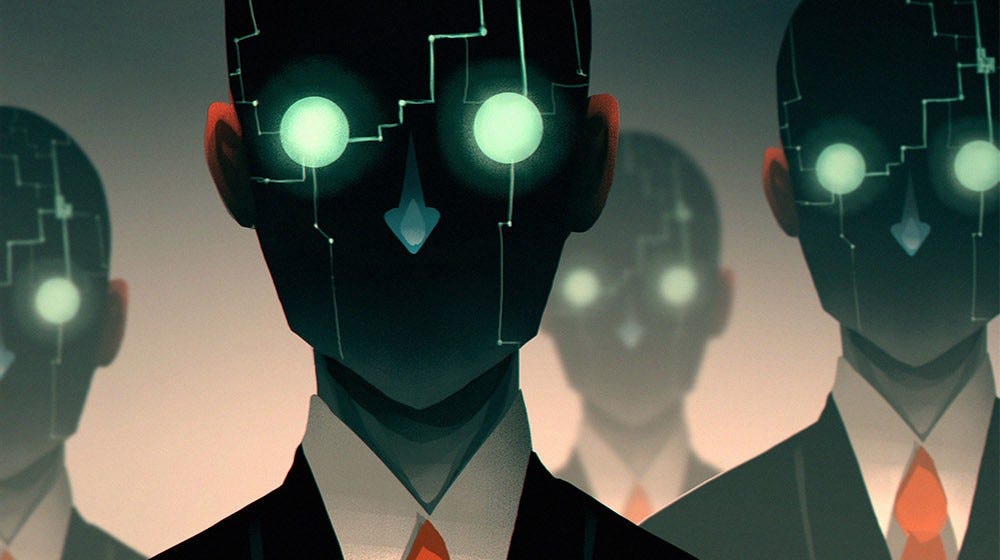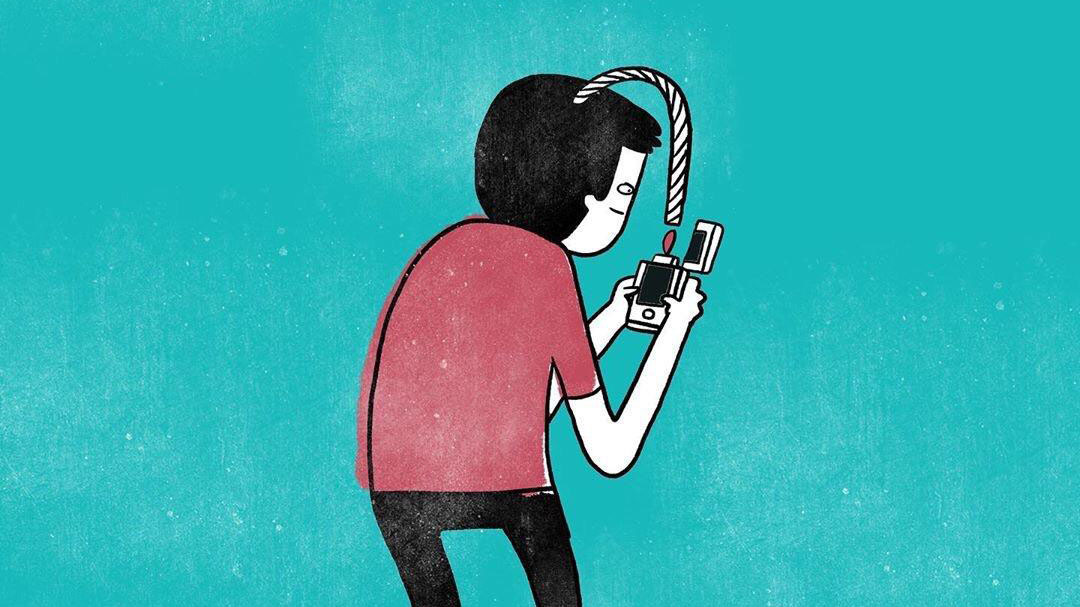how the modern web left humans behind
ChatGPT and its competitors are quickly turning search, news, social media, and even shopping into a complete dumpster fire.
Since this newsletter isn’t starting completely from scratch, there are posts from the old blog which are not only still relevant in the moment, they require another look, or a proper follow up, or even a remix of sorts. Still relevant and worth a revisit, still useful, with just a little more editing. So, after a few long, thorough dives into the ye olde ye archives, I found some posts which meet these criteria and decided to, for the lack of a better term, revisit them. We’ll begin with a prediction which, unfortunately, started to come true, more than likely to your dissatisfaction as much of your search, news, and streaming experiences started feeling… off.
As more and more AI agents are being unleashed on every aspect of our lives, the basic functionality of the internet we once loved and are now endlessly complaining about, have been going to shit rather quickly. Even worse, our experience with most technology is about to become even shittier as both owners and users of all these AI bots race to to pilfer the last dollars in Web 2.0’s rotting cadaver. The root cause of the problem is that instead of leveraging an open, interlinked web as intended by its creators, we’re being herded into walled gardens where an AI tries to force us to stay instead of functioning as a gateway to new, fun, and useful stuff.
After quite a bit of gnashing of teeth, rending of garments, and spilling of, well, bytes to be appropriately pedantic, about the jobs about to be destroyed by ChatGPT and its competitors, journalists are now cataloguing just how terrible they’ve made search and our overall web experiences. Article after article notes how everything just feels so… grimy, scammy, bare bones, and low effort, so every new technology is starting to be met with a deep sigh and a “so, how will this make life even worse?” Compare this to the wide eyed excitement at every newly announced feature through the 00s until the middle of the 2010s, when major problems started to get noticed.
the ai monster is spreading its tentacles
This is why new AI tools have gotten such a chilly and apprehensive reception when they wandered into the worlds of art and text. Reporters expected some nasty catch. Right now, the villains in focus are Large Language Models, or LLMs, like ChatGPT, GitHub Copilot, and Bard, being used to enable creepy chatbots, write crappy code, and turn internet searches into an answer from the aether — quite likely brought to you by an ad rather than an analysis of the web’s endless ocean of data — instead of that familiar list of results to pursue, with the potential to turn a simple question into entire nights of learning and deep dives into new passions.
Generative AI now creates torrents of content very quickly, with minimal prompting, answering questions and expanding on concepts both as tersely as possible, and in tsunamis of logorrhea depending on your request. It can also be passable enough at first glance, include links, and provide unique verbiage for every request. And this is why both Google and Bing are including them in search, summarizing data from the billions of websites indexed by their web crawlers over the past few decades. But their inability to fact check themselves, stop making things up, or prioritize pushing ads, are eating away at the quality of our search results.
But wait, it gets worse. You know who else needs a lot of content at short notice and doesn’t necessarily care about its quality while also being less than excited to pay for it? Buzzfeed and other publications that rely on social media by pumping out as many quizzes, explainers, and clickbait for traffic and ad revenue. They’ve taken notice and either signaled their willingness to use AI to generate much of that content instead of paying writers, or just started quietly pumping out AI-generated articles with strange bylines. With most media in dire straits, often failing to break even or being wrung dry by predatory owners, expect to see a lot more of this in your timeline.
a machine-generated reality, just for you
Worse still, social media platforms’ algorithms very much encourage divisive clickbait rather than real, factual news since outrage generates more ad views and metrics to sell to advertisers. This is why the platforms want these stories to dominate timelines if you’re not hypervigilant about muting or blocking. A lot of unscrupulous writers and editors know this, which is why so many stories across social media already sound as if they were written by a bot to hit a quota of partisan outrage buzzwords. Just spend an hour doomscrolling through a timeline without taking the proper precautions and see how quickly the content gets ugly, accusatory, and combative.
Lefty publications ask if literally anything you think, say, do, or enjoy is racist, classist, or colonialist, going to far as to condemn a viral charity stunt on YouTube in which a thousand people with vision problems got eye surgery as “ableist.” Meanwhile right-wing outlets are livid that everything from strip clubs, to banks, to the military, to our corporations are now “too woke” while decrying Chick-fil-a’s new cauliflower offering as the chain succumbing to Woke Marxist Villainy™. The game is simple. To use your brain’s natural predisposition to caution and pessimism, and unleash a steady stream of fear and misery so you click on as many headlines as possible.
Now, I have to point out that ChatGPT will refuse prompts to generate outrage bait if you ask it to do that. However, its competitors could be inclined to make a container ship full of cash by letting culture war mouthpieces like the Daily Mail, Rebel, or Daily Wire use it to raise grandpa’s blood pressure for clicks at an inhuman rate. Before he can get over the latest conspiracy theory, another dozen have already been created, published, and lined up for his next click. Just imagine his typical, already clickbait-heavy timeline, exploding with ever more infuriating content, algorithmically tweaked and analyzed to churn out a buzzword-laden torrent of bile, trolling, and paranoia.
Now, combine it with other AI models to create incendiary images and videos, taking fake news to levels not seen since the heyday of yellow journalism of the 1900s, when news aimed for the public invented entire nations, wars, and planets just to sell a few more newspapers. So, the future may be AI clickbait dominating personalized search results instead of real, factual news. Facebook, Twitter, err, I mean, X, and TikTok win, the media outlets win, and the AI companies win. The humans? Who cares? They’re just the product of ad-supported platforms anyway, so what happens to them is only consequential when it affects revenue and market valuations.
so, who is the web really for nowadays?
At this rate, we may even end up with a web where algorithms use AI to write for other AI and algorithms to win a ranking war in which all humans are required to do is click a link, view an ad, and ideally, buy. It’s an ecosystem where we’re just a mechanism that triggers an exchange of cash and validates this exchange as legitimate. That’s it. This is Silicon Valley’s AI web’s ultimate plan for us. Forget being the world’s encyclopedia, the internet is now just a big shopping mall for bots, and we’re just wallets attached to sacks of meat in our current dehumanizing, unsustainable, and exploitative model for the web, becoming nothing more than expendable cogs in our own machines.
There’s a reason why ad supported sites were called the original sin of the web, and we’re seeing why right now. Rather than incentivize good content and its stickiness, as was intended, they ended up over-saturating the web to such a point that humans began to tune them out, so the game is now to get clicks and eyeballs by any means necessary. Meanwhile, ads became desperate and predatory, and fraught with fraud and scams no one wants to fix because better, cleaner ads mean less revenue. And this brings us to the ultimate question in all of this. What are we doing and how did we let this get so bad?
For better or worse, the web isn’t going away. It’s too useful and there’s still too much great information that is properly vetted, added by experts, and forums that connect people for the best possible reasons. But in order to leverage all that good and useful information, and to make those mutually beneficial and life-enriching connections, we need a web that actually works, not bots using an n-dimensional language probability map and ad rankings throwing something that sounds plausible at the wall to see if it sticks. Sadly, we are now well on the way to the latter and the broad consensus is that we hate it, which is why we’re pushing back on it so hard…
![[ world of weird things ]](https://substackcdn.com/image/fetch/$s_!V-uR!,w_80,h_80,c_fill,f_auto,q_auto:good,fl_progressive:steep,g_auto/https%3A%2F%2Fsubstack-post-media.s3.amazonaws.com%2Fpublic%2Fimages%2F93728edf-9a13-4b2b-9a33-3ef171b5c8d8_600x600.png)


